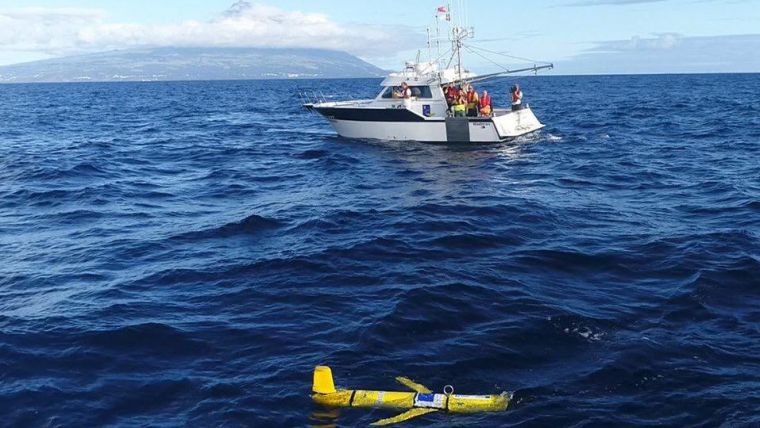Glider Launched in the North Atlantic As Part of EU Project
The Irish Marine Institute's marine glider was deployed in to the North Atlantic Ocean as part of the 5th project meeting for the Innovation in the Framework of the Atlantic Deep Ocean (iFADO) project recently held in The Azores, Portugal. The Slocum glider, Laochra na Mara, can reach depths of 1,000m and collects oceanographic data on conductivity, temperature, depth, fluorescence, turbidity and dissolved oxygen.
The glider was deployed from the RV Águas Vivas, and a number of researchers were invited to join and assist from a nearby vessel, RV Arquipélago. Prior to deployment, the glider was exhibited to the public at the Horta Maritime Terminal. Local school students meet iFADO team members and viewed several videos about glider operations and missions. The school students also wrote messages on the glider before it was deployed.
Ocean Temperature, Salinity and Currents
Thomas Dabrowski of the Marine Institute said, "Equipped with a wide variety of sensors, the glider can gather information about ocean temperature, salinity and currents, and transmits this information to shore via satellite. Gliders are able to provide real-time data, and provide a better assessment and understanding of our ocean environment."
Gliders are programmed to surface at designated times throughout their mission and transmit the data collected while at the same time downloading new mission instructions. This two-way communication allows gliders to continually gather information about the most important and diverse regions of our ocean basins 24 hours a day.
The glider was recently recovered in the North Atlantic Ocean after 15 days at sea. The Slocum glider covered over 250km and performed over 40 deep dives having successfully completed its mission.
European Union's Interreg Atlantic Area Programme
The iFADO project aims to create marine services at regional and sub-regional scale using the EU Atlantic Waters as a case study. The project combines traditional monitoring with cost-effective state-of-the-art technologies such as remote sensing, numerical modelling and emerging observation platforms such as gliders and oceanic buoys. The Marine Institute is one of 20 partners from Ireland, UK, France, Portugal and Spain involved in the iFADO project.
The 5th iFADO project meeting gathered 50 participants and partner leads presented the latest results from the project and discussed future synergies and follow-up actions. The project has received funding from the European Union's Interreg Atlantic Area Programme.














